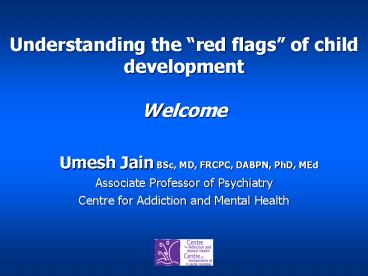Understanding the red flags of child development Welcome - PowerPoint PPT Presentation
1 / 29
Title:
Understanding the red flags of child development Welcome
Description:
Umesh Jain BSc, MD, FRCPC, DABPN, PhD, MEd. Associate Professor of Psychiatry ... The dominator 'I'm calling CAS, I'm going to kill myself.' The provoker ' ... – PowerPoint PPT presentation
Number of Views:127
Avg rating:3.0/5.0
Title: Understanding the red flags of child development Welcome
1
Understanding the red flags of child
developmentWelcome
- Umesh Jain BSc, MD, FRCPC, DABPN, PhD, MEd
- Associate Professor of Psychiatry
- Centre for Addiction and Mental Health
2
Objectives
- Development of habits and the impact on learning
- The implications of the no word
- Yes, but negotiate and reinforcement strategies
- Learning behaviors
3
Normal Child Development
- Understand normal development first
- Emotional self regulation
- Construction of self-directedness
- Basis of interpersonal relationships
- Self esteem learning self-directedness
- The internalization of the positive message
4
Normal Child Development
- Children cry to communicate
5
Normal Child Development
- Children cry to communicate
- Do I want my Mom or Dad?
- Button pushing is a normal developmental process
- Children convert this into other forms of button
pushing
6
Normal Child Development
- I look at you
- www.gruberkidz.com
7
Normal Child Development
- I look at you
- The anthropological explanation?
- Rule of child development
- If you look at a behavior it will go up
- If you dont look at a behavior it will go down
8
You learn the no word
- Emotional self control
- Separation of child from parent
- I want.
- Transitional objects and true emancipation
- Relinquish power and see no as a means to
protect not reject
9
My ability to push buttons
- The charmer
- I just love you Mom
- The guilt master
- You are unfair, no one loves me, I hate you
- The dominator
- Im calling CAS, Im going to kill myself..
- The provoker
- Im going to hurt you, Im going to irritate
you.. - The passive-resistor
- Cold shoulder, rolling eyes, forgetfulness..
10
Oppositional Defiant Disorder
- Pushing buttons
- Need to clarify the rules
- Insecurity of authority
- Problems in trust
- Survival instinct
- False self
11
(No Transcript)
12
Normal Child Development 3-6
- Physical Changes
- Just plain cute
- Connection to Peers
- Gender Identification
- Autonomy
13
Normal Adolescent Development 12-18
- Physical Changes
- puberty
- Connection to Peers
- Sexuality
- Emancipation
- Development of identity
14
Normal Development 45-55
- Physical Changes
- Peer Connection
- Sexuality
- Autonomy from your children
15
The no theme
- Psychological
- The no word is not about rejection, it is about
acceptance and protection - I push buttons to see if you love me
- LION KING as a theme of trust, abandonment
- Simba is ADHD
- Internalization of the positive object
16
Important to focus on strength
- We tend to focus on negatives
- what is it that I want you to do, not what
irritates me - What are they good at?
- The basis of construction of habits and positive
reinforcement - The management of learning disabilities relies
heavily on habit development
17
Basis of all learning is to create new habits
- Must break old habits
- Create new habits
- Reinforcement strategies critical
- Habits circumvent attentional problems
- Habits constrain impulse difficulties both motor
and emotional (e.g. anger management)
18
Reinforcement strategies
- Fixed reward systems
- Token economy
- Variable reward systems
- When low attention and high impulsivity is a
factor
19
Yes, but negotiate
- Reinforce positive work ethic
- Basis of self esteem
- Deals with their omnipotence
- Makes the clear message You want it, I want to
give it to you but how hard are you going to work
to get it?
20
The most basic habit- High 5s
- Wallet, money, ID
- Keys
- Pen
- Scheduler
- Watch
21
(No Transcript)
22
Positive Daily Report Card
- Emphasis on positive behaviors
- Reinforcing the role of the teachers strength
- Way of monitoring learning and modifying
strategies - Becomes a combination homework agenda book
23
Understand their learning style
- What modality is their learning strength?
- Visual
- Kinesthetic
- Auditory
24
Limiting the sensory environment
- Sound reduction
- Visual interference
- Tactile environment
- Positive smells
- Adequate nutrition
25
Time Perception
- Notice how time seems to change at will
- Inattention and poor time perception linked
- Zoning out
- Important to use timed-based strategies
- Timers
- Schedules- get the white board out
- Keep it short monitor reward
26
Scheduling Critical
- Fastest way to deal with chaos
- Family weekly appointment time
- Myth free time is freedom time will take
control of YOU - Fact scheduling is capturing time and is
freeing YOU control time - Scheduling of fun
27
Perception of volume
- If it looks like it is too much
- they will shut down
- Activation- attention- effort
- Will power vs detachment?
- Limit informationbite sized chunks
- Variety and positives
28
Short Snappers
- What learning deficits do YOU want to talk
about.
29
Conclusions
- Self esteem is key to learning FIRST
- Developing habits and gaining control
- Construct a learning environment SECOND
- Understand how sensory inputs affect the
receptive message - Keep it short and reinforce

